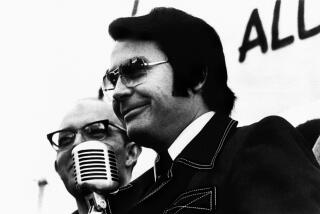Flaws of the Cult of One Personality : Its Unchecked Decision-Making Slowed Path of Socialism
- Share via
MOSCOW — When we analyze the difficulties and shortcomings of socialist development, we must look back on the people who stood at the helm of the party and government. I am not sure we are ready for a comprehensive and strictly objective assessment. I believe we underestimated the role of individuals in history. It is undeniable that individuals have exercised tremendous influence in the history of the Soviet Union, both positively and negatively.
At the same time, we must not overestimate the role of individual leaders. It is necessary to subject to a thorough scrutiny the mechanism that enabled Josef Stalin, Nikita Khrushchev and Leonid Brezhnev to concentrate in their hands enormous power, on the one hand, and to have the trust of the people for a considerable part of their rule, on the other. It would be wrong and humiliating for the Soviet people to assume that they were either blind and mindless or suppressed and intimidated by the will of a sole leader.
I agree with those who maintain that the Soviet Communist Party and the Soviet people have always enjoyed a mutually satisfactory relationship. How can we explain that the Soviet Union made a major contribution to victory in World War II, given the damage that Stalin had done to the country and the people? By Stalin’s greatness and wisdom? Impossible. He had eliminated most capable party, army and state leaders, the cream of the nation, but he had not paralyzed the nation. The Soviet people withstood the Nazi blow of monstrous force.
It goes without saying that Stalin relied on the people’s faith in the righteousness of the party cause, on their striving for socialism, and on the belief of a majority of working people in the reality and significance of the country’s social and economic achievements.
Stalin managed to make the majority identify all these successes with his name.
How Stalin did it and the nature of this unusual phenomenon have yet to be studied. One thing is certain, though. He created such an aura around his name that during the war and afterward, people were sincerely dedicated to Stalin and believed in him thoroughly.
Stalin used not only our achievements to build up his authority. He also made use of the difficulties we had to overcome and the dangers that threatened us on all sides. It is true that there was the resistance of the anti-socialist elements in the country and differences in the party about the ways in which socialist construction should be enacted. But Stalin exaggerated these to his own advantage. He convinced the majority of people that the enemies of socialism and the former opposition leaders had turned into spies and subversives.
It is frequently asked: Did the system create Stalin or did Stalin create the system? I believe the question is oversimplified. Stalin aptly used elements of the system of proletarian dictatorship (the rule of the working class) to exert his personal authority, and he developed and strengthened those elements that were conducive to undivided rule.
Khrushchev made a bold and correct decision when he condemned Stalinism and initiated serious social and economic reforms. That won him tangible respect and support among the people. When Khrushchev started making arbitrary moves and violating the principles of collective leadership, the Central Party Committee strongly criticized him and ousted him from his party and government posts.
Brezhnev, too, at first commanded respect in the party and among the people. Subsequently, however, society changed its attitude due to negative economic, social and political developments.
The rise of one personality, which was typical of practically every socialist nation, led to unchecked decision-making. Morally, it was manifested in a situation where officials and functionaries failed to discharge their sacred duty--to tell the truth--especially if it contradicted the opinion of their superiors. Thus people were afraid to tell Stalin what they knew about the Nazis’ imminent attack against the Soviet Union.
The desire to combine posts proved irresistible. For a long time Stalin kept only the post of general secretary of the Central Committee of the Communist Party. He was satisfied with it, knowing that he was called “the Great Leader,” “the Teacher” and “the Wise Father.” In 1941, however, he also became the chairman of the Council of People’s Commissars (the government). Khrushchev, who had criticized Stalin for this, combined the post of first secretary of the Central Committee and the post of the chairman of the Council of Ministers. Brezhnev, who replaced Khrushchev, was general secretary and president of the Presidium of the Supreme Soviet (the Parliament).
Historians can note with satisfaction that this tradition has ended.
Violations of the principle of collective leadership and of democracy had an adverse effect on the development of Soviet society. Our current backwardness in a number of areas, the need for restructuring and the present difficulties cannot be explained any other way. Complex closely tangled circumstances, reasons and factors slowed our progress and prevented us from reaching our goals.
As Mikhail S. Gorbachev has said, “The roots . . . of the difficulties we have had to face in the past few years are not in the nature of the socialist system but in an insufficient utilization of its possibilities, not in socialist democracy as it is but in shortcomings in its functioning.”
More to Read
Sign up for Essential California
The most important California stories and recommendations in your inbox every morning.
You may occasionally receive promotional content from the Los Angeles Times.













